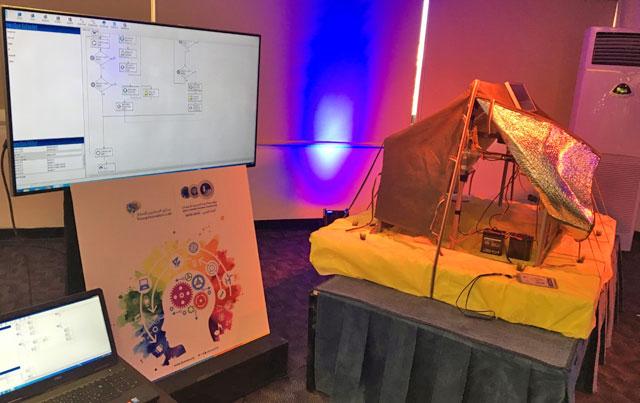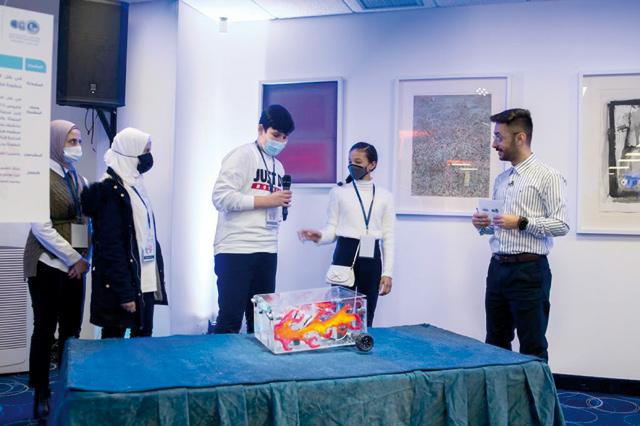You are here
Innovators laboratory helps students ‘learn how to learn’
By Sawsan Tabazah - Oct 24,2016 - Last updated at Oct 24,2016

An invention created by students through the Young Innovators Laboratory is on display in Amman on Sunday (Photo by Sawsan Tabazah)
AMMAN — Six projects by 22 students were honoured at the graduation ceremony for the Young Innovators Laboratory on Sunday in Amman.
The projects were developed to address various problems in daily life.
Students designed the “Care to revive” project to look after plants when nobody is around to take care of them.
The machine, which is equipped with temperature and humidity sensors, waters plants in their owners’ absence.
Another project, a self-cleaning window, aims to remove the need for people to risk their lives cleaning windows on tall buildings.
The one-year project was a collaboration between the Abdul Hameed Shoman Foundation (AHSF) and Palestine’s Al Muntada Young Scientists Club, which launched the programme in 1996.
Waleed Deeb, the founder of Al Muntada Young Scientists Club, said that around 2,000 people had benefited from the project in Palestine, while some 35 projects had been patented.
One of the project’s graduates has received a PhD in computer science in the US and works at Facebook, while another graduate owns a robotics company in California, Deeb told The Jordan Times.
The designs developed by the students during the year are not important, he said, noting that the goal of the project was to teach children how to learn.
“Although these are the outcomes; it doesn’t matter to us. We really don’t care. We want the students to learn how to think. To learn how to learn is the essence. All these are tools. The objective is to learn how to learn.”
The students, aged between 10 and 13, attended workshops in critical thinking, scientific applications and electronics, and worked in teams on their designs, mentored by engineering students.
Issa Nshewiat, the head of education and community outreach at AHSF, said the project would be expanded to Karak, 140km south of Amman.
The inventions of the 22 graduating students will be improved in a development stage, he added.
Deeb said three of the projects have the potential to be registered for patents.
Meanwhile, AHSF CEO Valentina Qussisiya said the project’s transport and equipment costs were around JD40,000.
The mother of Salah Al Din Abu Samak said participating in the project enriched her son’s creativity, an aspect which, she said, had been neglected at school.
Her son was on a team that invented a smart tent with automatic cooling and heating systems, which uses sensors powered by solar energy to stop water leakages.
The team behind the tent designed it to avoid deaths of infants in refugee camps during heavy rain in winter.
Related Articles
AMMAN — Abdul Hameed Shoman Foundation’s (AHSF) Knowledge Path library, organised an exhibition showcasing the scientific projects of Young
AMMAN — What does it take to become an inventor that can make a difference? After all, the prosperity of an entire country might be a g
AMMAN — A new collaboration between Jordanian and Palestinian universities was launched on Saturday at the Dead Sea with the unveiling of th














